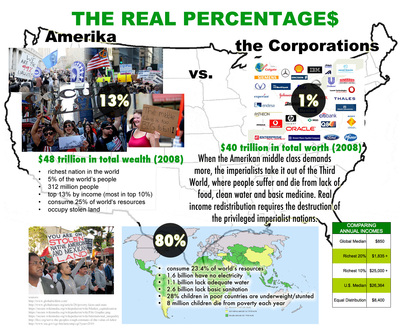
Newsflash: Amerikans are the Top 13 Percent
Recent demonstrations in U.$. cities have claimed to represent “the 99%” opposed to the greed of the richest 1%. MIM(Prisons) supports a more equitable distribution of the world’s resources. What most Amerikans don’t realize is that a true redistribution of wealth would mean less for them as they are all part of the richest 13%.
In 1970 an action similar in form to Occupy Wall Street! (OWS!) occurred in response to the assassination of students at Kent State University. In response, a local union rampaged through the street beating the students and attacking state offices. Reflecting on this event, a radio host implied OWS! was evidence of progress, measured by the union support it has received.
The material conditions of the U.$. invasion of Vietnam forced Amerikan youth at that time to take a more progressive position than today, leading them to come at odds with white nationalist unions. The OWS! actions are even more within the realm of white nationalism than the so-called “Battle in Seattle” in 1999 where anarchists and environmentalists linked arms with unions to oppose the World Trade Organization. Only the likes of MIM and J. Sakai recognized the reactionary white nationalism that anti-WTO sentiments were being focused into within the Amerikan context. Yet, at least the anarchists had a healthy dose of internationalism motivating them back then.
With OWS! the principal cry is “defend the Amerikan middle class.” While anarchists are attracted to the form (spokes councils and consensus open to “the people”) the content is hopelessly white nationalist. It is the exact type of rhetoric that the social democrats of post-depression Europe spit that led to the rise of fascism in many countries.(1) When the privileged nations of the world feel their privilege is threatened they become uncharacteristically politicized in their demands for more. They attack the ultra-rich in order to create the illusion that they are poor in comparison. But facts are stubborn things, and the interests of Amerikans lead them to cry for the ultra-rich to defend Amerikan jobs and back the massive lines of credit they have taken out. Both demands are incompatible with the struggle for migrant rights, which has been in vogue among the white nationalist left in recent years.
MIM always said if real economic hard times hit the imperialist countries, we would see a rise of fascism more than an interest in Maoism. We say this not to instill fear and arouse emotions but to promote a realistic assessment of conditions. Amerikan youth are the ones who put their bodies on the line in Seattle and now in New York and elsewhere. Because of the decades of life they have ahead of them, young people have more interest than their parents in transforming this world to a more equitable one. But to do so they must see things for what they are and get behind the real forces for progressive change.
- Corcoran Represses Strikers: Denies Salts, Sugars, Liquids
- Abolish the SHU, Create Leaders Throughout the Prisons
- Olympics = Global Village = Globalization = Imperialism
- Step Up 4, Revolution or Spectacle
- Cap the Maximum Wage in the United $tates
- "Party People" Problems
- Amerikans Richer Than Ever
- Hearing Voices
- Importance of Independent Institutions
- In Time: Proletarian Premise with Focoist Mistakes
- Police Brutality in California, Again








